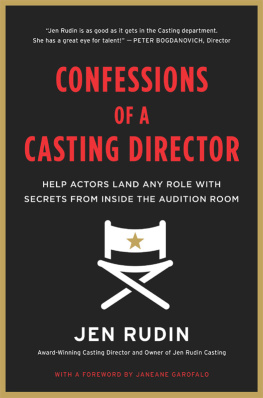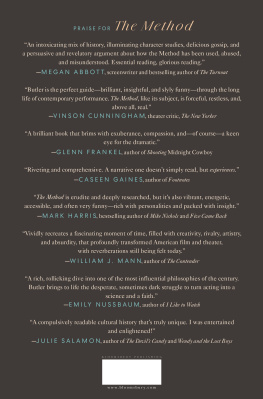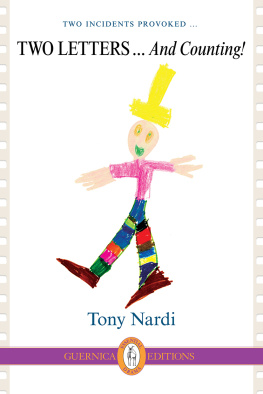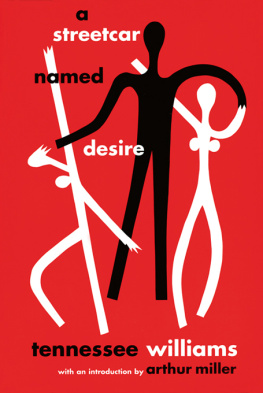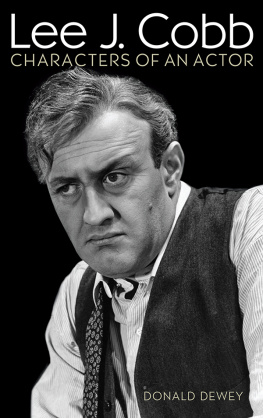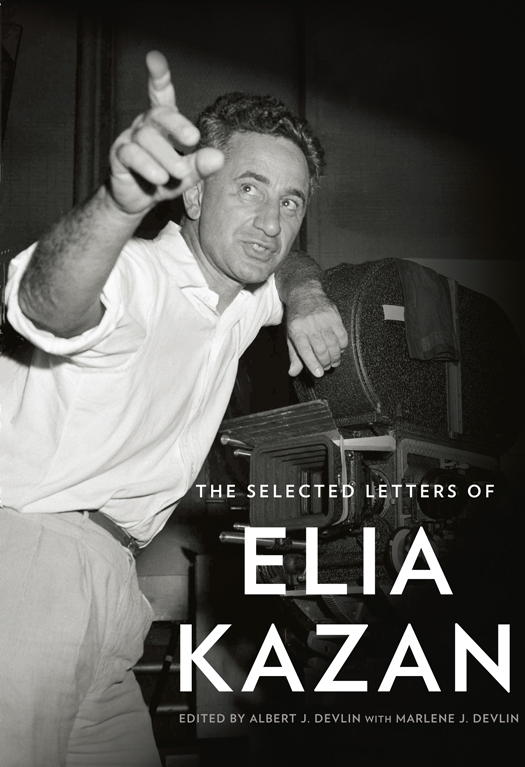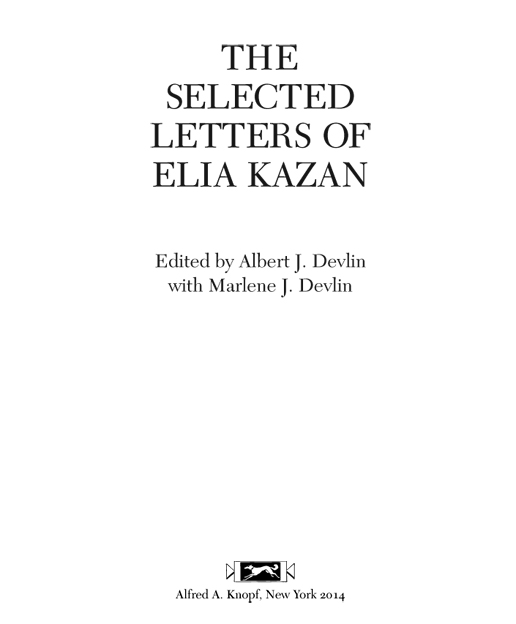ALSO BY ELIA KAZAN
On Directing
Beyond the Aegean
Elia Kazan: A Life
The Anatolian
Acts of Love
The Understudy
The Assassins
The Arrangement
America America
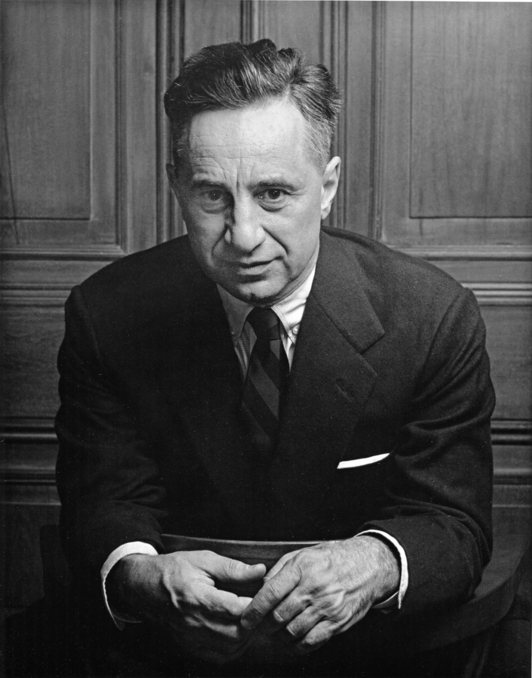
(photographic credit )
THIS IS A BORZOI BOOK PUBLISHED BY ALFRED A. KNOPF
Copyright 2014 by Frances Kazan
Introduction and annotations copyright 2014 by Albert J. Devlin
All rights reserved. Published in the United States by Alfred A. Knopf, a division of Random House LLC, New York, and in Canada by Random House of Canada Limited, Toronto, Penguin Random House companies.
www.aaknopf.com
Knopf, Borzoi Books, and the colophon are registered trademarks of Random House LLC.
Library of Congress Cataloging-in-Publication Data
Kazan, Elia.
[Correspondence. Selections]
The selected letters of Elia Kazan / edited by Albert J. Devlin with Marlene J. Devlin.
First edition.
pages cm
ISBN 978-0-307-26716-0 (hardcover) ISBN 978-0-385-35041-9 (ebook) 1. Kazan, EliaCorrespondence. 2. Theatrical producers and directorsUnited StatesCorrespondence. 3. Motion picture producers and directorsUnited StatesCorrespondence. I. Devlin, Albert J., editor of compilation. II. Devlin, Marlene J., editor of compilation. III. Title.
PN 1998.3.K39A3 2014
791.430232092dc23
[B] 2013044122
Jacket photograph Harry Harris/AP
Jacket design by Carol Devine Carson
v3.1_r1
CONTENTS
INTRODUCTION
Letters are a pure form of autobiography. Those written by Elia Kazan and selected for publication begin in 1925 with an adolescent complaint of paternal authority and conclude sixty-odd years later with a fathers reaffirmation of love for his five children. The intervening letters tell the story of an actor-director who trained in the Group Theatre, brought artistic rigor to Broadway, collaborated with major writers, testified as a former communist before the House Committee on Un-American Activities, inspired a generation of young actors, filmed challenging subjects in remote locations, and codirected the new Repertory Theatre of Lincoln Center. In later years he traveled widely and became a best-selling novelist. Elia often thanked correspondents for their fine letters and saved them all, or so it seems, including youthful scraps of correspondence from his children. He lacked the rare, extemporaneous gift for language possessed by his friend, collaborator, and frequent correspondent Tennessee Williams. But as one might expect, Kazan was diligent. Lengthy, detailed business letters were often typed on yellow paper, scrupulously edited, and retyped by a secretary, whose command of spelling and punctuation far exceeded Kazans. Personal and family letters retain the engaging eccentricities of darting, digressive thought, convoluted syntax, rich colloquial diction, pungent humor, the occasional sharp image, and in the case of his correspondence with Molly Day Thacher, his first wife, a searing intensity of self-disclosure.
Elia Kazan was born in Constantinople in 1909, his brother Avraam nearly three years later in Berlin, where his father worked briefly for a carpet business founded by his older brother. An Anatolian Greek, George Kazanjioglou knew the fate of minority populations in wartime and wisely brought his family to the United States in 1913. Two sons (George and John) born in America completed the immediate family. George and Athena, their name shortened by convention to Kazan, settled on Riverside Drive in New York City before moving to New Rochelle in 1919. Elias shyness, bookish inclination, and strong aversion to commerce strained father-son relations and gave rise to a conspiratorial bond with Athena, who challenged eldest-son tradition by arranging for Elia to enter college rather than the Kazan Carpet Company in mid-Manhattan. Her indispensable ally was Anna Shank, Elias former eighth-grade teacher and first known correspondent. After graduation from Williams College in 1930, Kazan enrolled in the Yale School of Fine Arts and studied under George Pierce Baker in the new drama department. His attraction to the theater was not accidental, as he claimed at one point, but the outcome of a great thirst for knowledge shared by Harold Clurman and Lee Strasberg, directors of the Group Theatre, who, if they did not immediately welcome Kazan as an apprentice in 1932 or encourage his desire to act, recognized the energy and backstage skills he brought to the enterprise. Their intention to found a theater free of dramatic tricks and embroiled in contemporary American life enlisted Kazan for nearly a decade. Clurmans messianic pronouncements shaped his conception of theater as a high calling, while Strasbergs imperious control of production informed the stylized, intensely acted Broadway shows for which Kazan became famous.
No event had a more profound or enduring effect on Elia than his marriage to Molly Day Thacher in 1932. She was, as he wrote in long retrospect, the reassuring symbol that the very heart of America, which my family had come here to find, had accepted me (A Life, p. 569).
The outer shape of Kazans career is evident in correspondence with authors, actors, agents, producers, directors, designers, and reviewers with whom he routinely interacted. Correspondence with Darryl Zanuck and Jack Warner, legendary monsters who ruled the studio system at Twentieth Century-Fox and Warner Bros., is especially vivid and indicative of the bicoastal fame Kazan had achieved by the end of the 1940s. The inner story of his career is more subtly distilled in The Selected Letters. Persistence, self-confidence, and a remarkable fund of energy drew charges of undue ambition but formed the bedrock of Kazans determination to be A SINCERE, CONSCIOUS, PRACTISING ARTIST. This declaration was made in a letter to Cheryl Crawford, a director of the Group Theatre, in 1935, when Kazan had few if any artistic bona fides to claim. It may seem brash, pompous, or even affected when quoted in bold relief, but no statement in letters resounds through each phase of Kazans career with more force or integrity. One looks in vain in the correspondence for extended discussion of art, literature, politics, history, or religionnotwithstanding Kazans love of reading and education at Williams, when a bachelors degree in the liberal arts was still concentrated in philosophy, the classics, and study of language. Kazans subject in correspondence is invariably the self in search of artistic fulfillment. Its realization placed the stage and film director in relation with leading artists of pre- and postwar America and with a culture whose robust economy and far-ranging international prominence in the 1950s was oddly conjoined with political and moral contraction at home.
Kazans letter of artistic intent carried with it an equally brash, all encompassing program designed to make a director of the disappointing actor. Kazans potential in that regard had drawn an early judgment of no actors emotion by the directors and assignment to the onerous job of stage manager. Kazan went on to play significant roles in later Group productions, but by 1935 his stronger attraction was to stage direction. Any sense of the transition as merely expeditious is incompatible with Kazans earnest commitment to attaining the Raw Materials of the Director . The production-ideas of a director, he wrote to Cheryl Crawford, were not limited to scripts, nor did they leap from deep and dark inspiration. Their source was the experience of the artistwhat hes felt, known, remembersin short, experienced. Kazan would orientate himself to the world by frequent travel, especially to the South, a laboratory for social scientists in the 1930s, and in the meantime by amassing illustrative junk, including photographs, clippings, notes, plans, books, etc. etc. His directorial noteselaborate, detailed, and incisiveadd to the experiential base the imperative of intensive preparation for each assignment. From this fund of experience and conscious, that is, deliberate, planning, Kazan began the period of his major work in 1942 with Thornton Wilders serious comedy,


